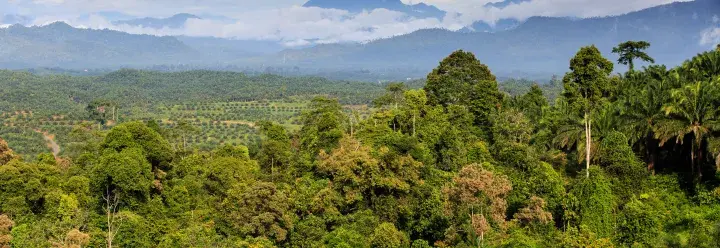New ISEAL Innovations Fund projects to boost sustainability at landscape level
A new round of funding awarded in April supports six new projects through ‘landscape grants’. Each project will test fresh approaches to increase the adoption of sustainable practises within a region or jurisdiction. Over the next two years these projects are expected to generate important learning for ISEAL members and the wider sustainability community.
ISEAL launched this latest round of funding to meet a growing interest in multi-stakeholder landscape and jurisdictional initiatives that address sustainability issues at scale. ISEAL members are also keen to test the many ways they can help drive positive impact at this scale, which was evident from the variety and number of concepts received. The Innovation Fund’s grant decision-making committee was particularly impressed by the quality, ambition and creativity of the proposals.
As in previous rounds, the grant committee prioritised those projects that can deliver the greatest value for our members and the wider sustainability community. What’s new and exciting about this set of projects is that they will test how standards systems can deliver positive impact at a landscape level. They will tackle some of the many difficult questions around the monitoring and verification of good practice at landscape level, either through adapting their models or working closely with existing and emerging landscape initiatives.
The six landscape grant projects
A shared value approach to corporate climate impact at landscape level: In collaboration with several ISEAL members, Gold Standard will develop a methodology to link standards to certified carbon emission factors that companies can account for in their greenhouse gas (GHG) reporting toward their ever-increasing climate targets. The methodology will be applied at landscape level and tested via pilots to deliver additional impact toward climate mitigation and unlock new value for standards and the corporates who support certified commodities.
Hybrid Community-Based Monitoring (HCM) System: Rainforest Alliance is partnering with the Ghanaian Sefwi Landscape Management Board, Sefwi Wiawso Municipal Assembly and Olam Ghana. The aim is to empower local communities to define and carry out a joint sustainable land use action plan at a landscape level. By combining Geographic Information System (GIS) technology with traditional community resource mapping, they will develop a monitoring tool that leverages links to other reporting frameworks like LandScale, Ghana’s national measuring, reporting and verification (MRV) system, Global Forest Watch and Olam’s Farmer Information System.
IMPACT Alliance: Textile Exchange and partners will test the viability of ‘impact incentives’ and ‘impact partnership incentives’, as innovative market-driven working models to scale and improve sustainability performance at a landscape level. After a scoping phase to assess market interest, the partnership will set up three pilots in the Southern Common Market (MERCOSUR) producing regions to incentivise best practices for beef, leather and soy. The partnership represents a new way of combining market support across multiple sectors. This will add value for sustainable primary production, using existing certification and benchmark tools to focus on key issues in critical landscapes.
Addressing the social dimension in sustainable cocoa sourcing landscapes in Peru: Fairtrade, under the lead of Max Havelaar-Foundation (Switzerland) and FLOCERT, will develop a landscape assurance framework for social indicators. The project is part of a larger 10-year landscape approach programme in San Martin, Peru — coordinated by Helvetas Swiss Intercooperation and funded through the Swiss Platform for Sustainable Cocoa. The project represents a valuable opportunity for Fairtrade to pilot an extension of the farm-unit certification approach and to test an assurance framework for social standards on a landscape level.
Boosting sustainability practice and performance at the landscape level through good water stewardship: the Alliance for Water Stewardship (AWS) and its country partner Yayasan Aliansi Wali Sumber Daya Air Indonesia (AWS Indonesia), together with partners, the Roundtable Sustainable Palm Oil (RSPO), the Global Platform for Sustainable Natural Rubber (GPSNR) and Lingkar Temu Kabupaten Lestari (LTKL, an association of Indonesian district governments working on collective action for sustainability) are working to identify practical means and incentives to drive good water stewardship practices in palm oil and natural rubber at landscape level. The project will develop guidance documents on water stewardship for RSPO and GPSNR implementers, and inform district level performance measurement through a pilot in Sumatra.
Adaptation to Landscape Approach (ATLA):This project aims to accelerate the adaptation of the BCI Standard System (BCSS) towards a landscape approach. The two-year initiative will assess how the Better Cotton Standard System could evolve to better manage resources outside the ‘farm gates’ or traditional Producer Unit. The project will consist of a global strategy and roadmap development, identifying areas where BCI’s standard system is best positioned to take a landscape approach, including implications on assurance, monitoring and evaluation, and other related functions. This central strategy will also be supported by learnings from two pilot projects – an ecosystem level assessment in the Büyük Menderes basin in Turkey, and an adaptation exploring how the BCI model could be embedded into local government in Pakistan.
The ISEAL Innovations Fund, is a grant-making facility that supports standards systems to test projects that drive efficiency and effectiveness. Our portfolio covers projects relating to data capture and management, risk-based approaches to assurance, supply chain traceability systems, landscape approaches and solutions that deliver greater value to producers. Our support is possible thanks to the generosity of our donors the Swiss State Secretariat for Economic Affairs (SECO). We are grateful to the grant decision-making committee for their insightful and impartial review of the proposals and to SECO, for making it possible to test the innovations.


